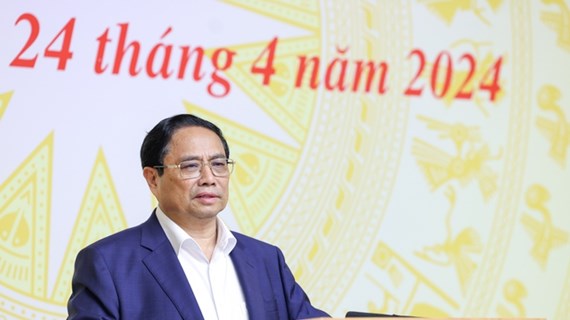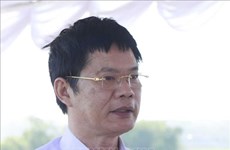Ageing population needs more nursing care
At 70, Nguyen Thi Chung has spent the last 10 years at a private care
centre in Dong Ngac Village, Tu Liem District. Her husband died years
ago and her only daughter became married.
At 70, Nguyen Thi Chung has spent the last 10 years at a private care
centre in Dong Ngac Village, Tu Liem District. Her husband died years
ago and her only daughter became married.
Using a wheelchair due to semi-paralysis, Chung said her daughter's home is ill-equipped to provide her with the care she needs.
"There are other elders here whom I can make friends with," she said. "During the weekend, we occasionally have musical performances. I like it here."
For generations, Vietnamese elders have had few alternatives when no longer capable of caring for themselves, traditionally staying with their families.
The choices include hospital-like residences run by monks at pagodas or public social welfare centres for those without relatives, homes or money. According to the Vietnam Association of the Elderly, there are only about 400 appropriate health care facilities nationwide.
Meanwhile, demographics are shifting. Even with its abundant labour force, Vietnam achieved its status as an "ageing population" in 2011.
The General Office for Population and Family Planning estimates the country's elderly population over 60 increased from 8.7 percent in 2009 to 10.1 in 2011, with the possibility of hitting 15 million people in the next 10-15 years.
Now, even in tight-knit families, many working adult children are unable to care for their weakening parents, making private care centres, or "nursing homes," a growing option in Vietnam.
Nguyen Tuan Ngoc, director of the private care centre in Dong Ngac Village, where Chung is staying, said he first notices the demand when setting up the first centre in Minh Khai Village in 2001.
At the time, Ngoc said he has to persuade people to come and live at the centre. Thirty elder residents come during the first three years.
In 2009, the facility moved to Dong Ngac Village, expanding to offer 250 beds across 4,000-sq.m area divided into intensive care, special care and places for those in good health. An additional five-ha centre will soon be put into operation in Soc Son Village.
"In Vietnam, there's a lot of stigma associated with sending elders to nursing homes," Ngoc explained. "We want to prove that with quality services, we can provide better living conditions for them than at home."
However, unlike nursing homes abroad where even healthy seniors prefer living, most elders at local private care centres suffer from chronic illnesses such as Alzheimer's, cardiovascular problems, diabetes and arthritis.
At the Dong Ngac centre, 70 percent of residents are in "weak" health conditions while 10 percent are categorised as "extremely weak." Ngoc admitted that elders who still enjoy good health prefer living at home where they help adult children take care of the grandkids.
Tran Viet Huong, from Hanoi, said her family has tried everything in taking care of her semi-paralysed father, who has suffered several strokes and a traffic accident.
Besides paying medical fees of up to 15 million VND (715 USD) per month, the family has to overcome criticisms from relatives for sending the father to the Dong Ngac centre.
"My father, similar to all other adults at the centre, receives qualified treatment and care," she said. "Residents can also participate in various activities in addition to receiving massages and exercise on a daily basis."
Dang Vu Canh Linh, deputy director of the Hanoi-based Institute of Tradition and Development Research, having spent years researching living patterns among the elderly, said the demand for private nursing homes will increase in the next 10-15 years.
Accordingly, nursing homes must facilitate interaction between the elderly and the outside world, especially with younger generations, to help them engage in social and charitable activities.
"During our research, we notice that many elderly people choose nursing homes, not because their children do not care for them, but because they want to retain their independence and make new friends," Linh said.
Le Tieu Binh, owner of two home-styled nursing homes in northern Linh Dam, Hoang Mai District, said this model allows staff to provide closer care to the elderly and make them feel at home.
Established in 2006, Binh's two care centres currently house about 50 seniors, most suffering from chronic diseases.
"We have one staff member living in each room housing the elderly," she said.
"In this way our residents have someone to talk to and feel less lonely."
However, such private nursing homes are only affordable to the minority.
A report released by the United Nations Population Fund in Vietnam in July 2011, titled The Aging Population in Vietnam, suggested that the development of private elderly care centres has been difficult partly due to "minimal consensus" from society and "no specific support from the Government."
Giang Thanh Long, vice dean of the School of Public Policy and Management of the National Economics University and UNFPA expert on ageing, said private nursing homes cannot currently meet demand due to high fees.
"The Government should support the constructing and development of private care centres by offering preferable policies on land leasing and taxation," he said, adding that this could help make private nursing homes more accessible to the majority.
Pham Tuyet Nhung, deputy head of the Vietnam Association of Elderly's Foreign Affairs Department, said it will take years before the country can have nursing homes that meet foreign standards.-VNA
Using a wheelchair due to semi-paralysis, Chung said her daughter's home is ill-equipped to provide her with the care she needs.
"There are other elders here whom I can make friends with," she said. "During the weekend, we occasionally have musical performances. I like it here."
For generations, Vietnamese elders have had few alternatives when no longer capable of caring for themselves, traditionally staying with their families.
The choices include hospital-like residences run by monks at pagodas or public social welfare centres for those without relatives, homes or money. According to the Vietnam Association of the Elderly, there are only about 400 appropriate health care facilities nationwide.
Meanwhile, demographics are shifting. Even with its abundant labour force, Vietnam achieved its status as an "ageing population" in 2011.
The General Office for Population and Family Planning estimates the country's elderly population over 60 increased from 8.7 percent in 2009 to 10.1 in 2011, with the possibility of hitting 15 million people in the next 10-15 years.
Now, even in tight-knit families, many working adult children are unable to care for their weakening parents, making private care centres, or "nursing homes," a growing option in Vietnam.
Nguyen Tuan Ngoc, director of the private care centre in Dong Ngac Village, where Chung is staying, said he first notices the demand when setting up the first centre in Minh Khai Village in 2001.
At the time, Ngoc said he has to persuade people to come and live at the centre. Thirty elder residents come during the first three years.
In 2009, the facility moved to Dong Ngac Village, expanding to offer 250 beds across 4,000-sq.m area divided into intensive care, special care and places for those in good health. An additional five-ha centre will soon be put into operation in Soc Son Village.
"In Vietnam, there's a lot of stigma associated with sending elders to nursing homes," Ngoc explained. "We want to prove that with quality services, we can provide better living conditions for them than at home."
However, unlike nursing homes abroad where even healthy seniors prefer living, most elders at local private care centres suffer from chronic illnesses such as Alzheimer's, cardiovascular problems, diabetes and arthritis.
At the Dong Ngac centre, 70 percent of residents are in "weak" health conditions while 10 percent are categorised as "extremely weak." Ngoc admitted that elders who still enjoy good health prefer living at home where they help adult children take care of the grandkids.
Tran Viet Huong, from Hanoi, said her family has tried everything in taking care of her semi-paralysed father, who has suffered several strokes and a traffic accident.
Besides paying medical fees of up to 15 million VND (715 USD) per month, the family has to overcome criticisms from relatives for sending the father to the Dong Ngac centre.
"My father, similar to all other adults at the centre, receives qualified treatment and care," she said. "Residents can also participate in various activities in addition to receiving massages and exercise on a daily basis."
Dang Vu Canh Linh, deputy director of the Hanoi-based Institute of Tradition and Development Research, having spent years researching living patterns among the elderly, said the demand for private nursing homes will increase in the next 10-15 years.
Accordingly, nursing homes must facilitate interaction between the elderly and the outside world, especially with younger generations, to help them engage in social and charitable activities.
"During our research, we notice that many elderly people choose nursing homes, not because their children do not care for them, but because they want to retain their independence and make new friends," Linh said.
Le Tieu Binh, owner of two home-styled nursing homes in northern Linh Dam, Hoang Mai District, said this model allows staff to provide closer care to the elderly and make them feel at home.
Established in 2006, Binh's two care centres currently house about 50 seniors, most suffering from chronic diseases.
"We have one staff member living in each room housing the elderly," she said.
"In this way our residents have someone to talk to and feel less lonely."
However, such private nursing homes are only affordable to the minority.
A report released by the United Nations Population Fund in Vietnam in July 2011, titled The Aging Population in Vietnam, suggested that the development of private elderly care centres has been difficult partly due to "minimal consensus" from society and "no specific support from the Government."
Giang Thanh Long, vice dean of the School of Public Policy and Management of the National Economics University and UNFPA expert on ageing, said private nursing homes cannot currently meet demand due to high fees.
"The Government should support the constructing and development of private care centres by offering preferable policies on land leasing and taxation," he said, adding that this could help make private nursing homes more accessible to the majority.
Pham Tuyet Nhung, deputy head of the Vietnam Association of Elderly's Foreign Affairs Department, said it will take years before the country can have nursing homes that meet foreign standards.-VNA













